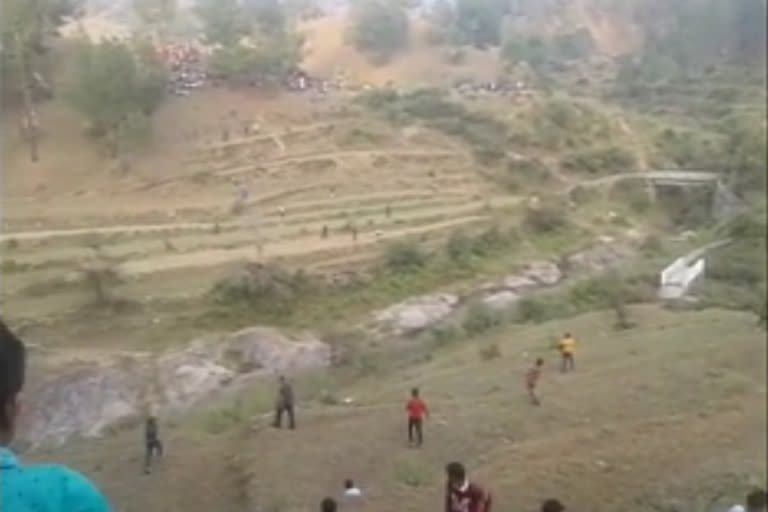Almora: Located 350km from the state's capital-Dehradun, the city of Almora is known as the Cultural city of Uttarkhand an abode to thousands of temples that grace the Himalayan landscape.
Surrounded by dwindling pines and old oaks, the city Almora conceals layers of history.
Govardhan Puja in Almora has been one of the most important elements of Uttarakhand's history.
Traditions are being practised for ages in the Patia village of the Takula block of district Almora.
Devotees turned up in large numbers and pelt each other with stones to celebrate Bagwal or war with stones (Paashan War).
This tradition is being observed here for centuries.
In the war of stones, the locals gather on both sides of River Pachghatiya and throw stones at each other.
Although it is said that, proper safety measures are taken for all those who are participating.
Like every year, this year Govardhan Puja was celebrated on October 28 and hundreds of villagers from nearby areas gathered to witness this age-old tradition.
According to the tradition, four local feudal lords-- Kotyuda, Kasoon, Patiya and Bhatgaon-are divided into two groups.
Hundreds of people witnessed the event
On the day of Bagwal, Patiya village was divided into two groups. One had people from Kotyuda and Kasoon villages and the other group had people from Patiya and Bhatgaon.
This year, the Bagwal lasted for about an hour and was completed after a villager reached the water of Pachghatiya river and touched it.
As per rituals, the stone war starts after offering prayers to holy cow at the Uttarkhand's Gayekhet ground.
The belief behind Uttarakhand's unique stone-throwing festival
As per the local, it is believed that the people from Pilkhwal village place a fig of the Pine tree in the ground and ask for permission to play the Bagwal.
Then both groups start pelting each other with stones at the local Pachghatiya river. Both the groups fight out to reach the banks of the river first.
The war is only over when a player from any of the team (village) reaches the river and drinks water from it.
After this people greet each other and leave with the promise of meeting next year.
Injured are treated with 'Bichoo Grass'.
There is no documented proof about the time this tradition of Bagwal started, but it is said that this tradition is observed to keep evil spirits away.
The villagers celebrate this unique stone-throwing festival in order to drive evil spirits away with stones.
Almost every year, many people are injured in 'Bagwal' stone pelting festival. Last year, over 120 got injured.
But, it is said that all injuries are treated with balm prepared from the locally found 'Bichoo Ghaas' or Scorpion grass.
Bagwal Festival is also played in Champawat
A similar tradition is also observed on the day of Raksha Bandhan at the Barahi temple of Champawat district.
Hundreds of people gather in the courtyard of the Devidhura temple and play Bagwal by throwing stones at each other.
Here in Champawat, it is celebrated to please Maa Barahi Devi, the presiding deity by shedding blood while throwing stones at each other.
The festival is celebrated annually on Raksha Bandhan, believing that the goddess is pleased only after blood, equivalent to a human sacrifice, is shed during the sport, which is witnessed by thousands of people.
Though there is a high court ban on the use of stones during the festival, locals manage to sneak in with stones, hoodwinking the authorities.
But, in few places, devotees play by throwing flowers at each other.
Also read: Nurses who bring hope to the sick people in Naxal villages



